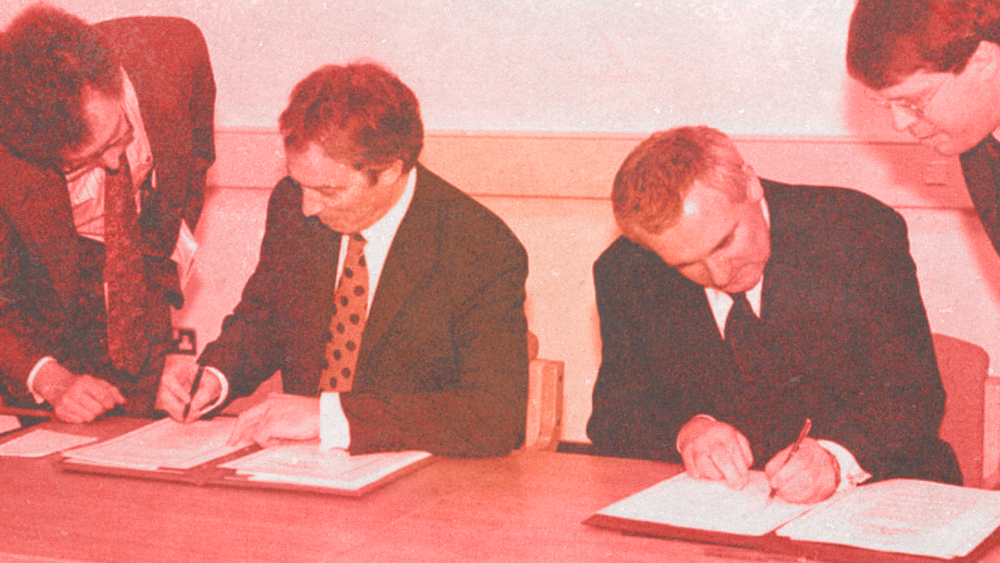Despite a lack of meaningful implementation, many continue to look to the Good Friday Agreement for guidance on how to negotiate peace
April 10 of this year will mark exactly 25 years since lengthy multi party talks culminated in the signing of the Good Friday Agreement in Belfast – an agreement which formally created the Northern Irish Assembly and was supposed to settle issues of cross-border cooperation between Northern Ireland and the Republic in the South.
Although the Catholic-Protestant disparity in Northern Ireland persisted, the agreement was approved by the majority of voters on both sides of the newly reinstated border during jointly held referendums in May 1998. The agreement is widely hailed as a successful template for peace, largely ending three decades of violence in Northern Ireland known as the ‘Troubles’ that had resulted from the partition of Ireland earlier in the century. But can it still stand up to the ever louder voiced demands – spurred on by Brexit – for a united Emerald Isle?
It just so happens that the Good Friday Agreement’s quadricentennial falls within what Sinn Féin leader Mary Lou McDonald has labelled the “decade of opportunity”. Many see the political development since the UK’s referendum to leave the European Union in 2016 as a phased but steady acceleration of another referendum – one on Irish unity. This development will most likely only be driven forward by the ongoing struggle to streamline trade to and from Northern Ireland.
While many argue for a separate discussion of the Good Friday Agreement and the post-Brexit turmoil, there is no denying that the two are interconnected. The ‘yes’ vote at the ballot box in 1998 was not just a ‘yes’ for peace, but also for a considerable degree of political sovereignty. Still, Northern Ireland remains in a political vacuum and its citizens are currently experiencing yet another crisis with no devolved government. This looks like there is not much to celebrate. Simply put, the peace agreement does not seem to have delivered what was arguably its most urgent purpose: A functioning government focused on mitigating the very real hardship experienced by its constituents, fueled by crises from global pandemics to war and the unsustainable cost of living.
A Growing Call for Unity
Irish unity might not be the silver bullet some would want it to be – and claim it could be. Public polls over the past years have not been able to indicate a clear trend among Northern Irish citizens, but the wish for a united Ireland is obvious. Only last October, Dublin’s biggest sports arena hosted an event on how this could be achieved with a number of Irish politicians and over 5,000 people attending. But there are many challenges to be resolved before this process can be successfully initiated – issues which might require a more succinct implementation of the Good Friday Agreement in the first place. Lessons can also be learned from the history of other countries which have reversed partition, such as Germany. While a united Germany is not an idea which should be contested per se, the imposition of a wholly new economic order on Eastern German states as a result of the end of the Cold War has led to financial hardship and a disillusionment which still fuels political resentment in these areas until today.
It is true nevertheless that an Irish island aiming for reunification would have to deal with a whole different and individual set of issues, such as healthcare, education and the protection of minority groups, to name a few. Nevertheless, drawing from flawed processes of the past can prove invaluable when wanting to envision an inclusive and just path to Irish unity which does not just look good on paper.
There is no doubt that the thought of Irish unity inspires progressives fighting for the liberation of all people not just on the island, but globally. Still, there is value in highlighting the importance of peace agreements such as the Good Friday Agreement, especially in light of populations bearing the brunt of war, violence and geopolitical power struggle.
A clear vision of what is most urgently needed to stop the suffering of the many often leads to a conclusion which involves compromise. That is why agreements such as the one negotiated 25 years ago in Belfast still have the potential to inspire future peace deals which focus on providing fast relief for the people and a platform from which to drive the democratisation of our political and economic systems forward. The comprehensive implementation of the Good Friday agreement might just be one of the most crucial steps on the way to an informed and successful referendum on Irish unity in the near future.
Do you want to be informed of DiEM25's actions? Sign up here















